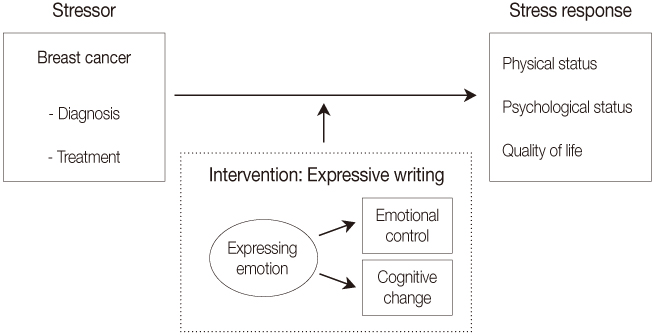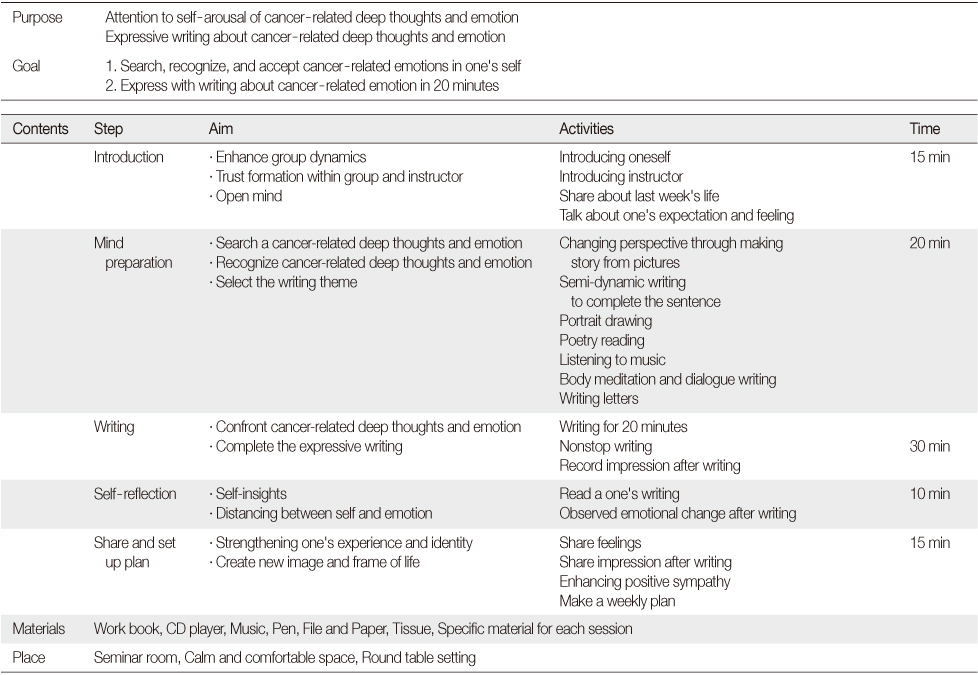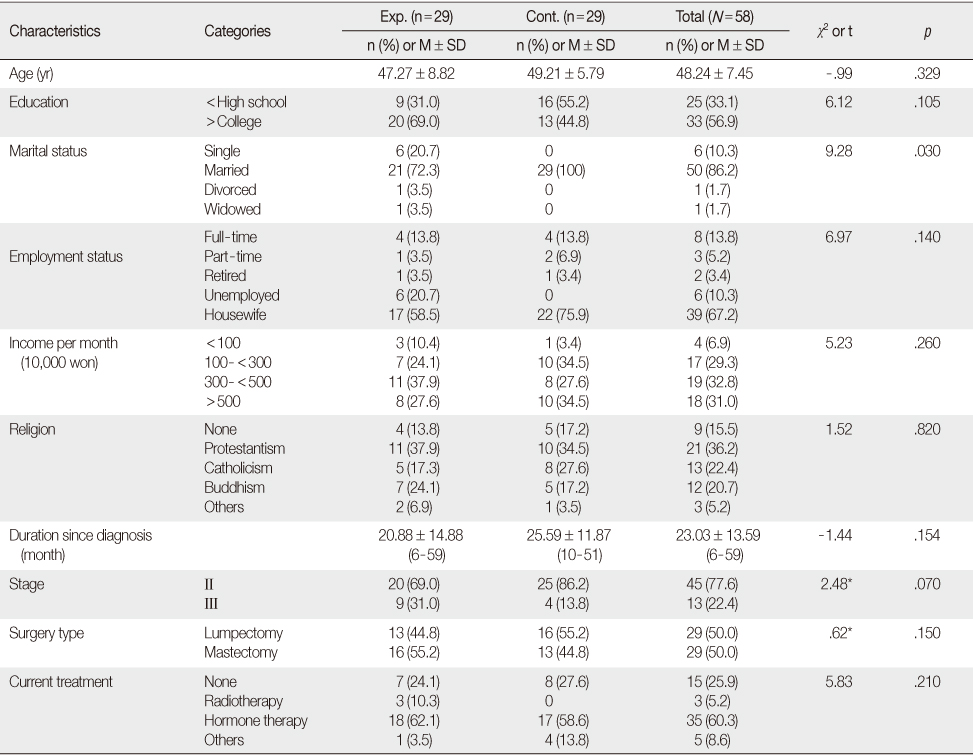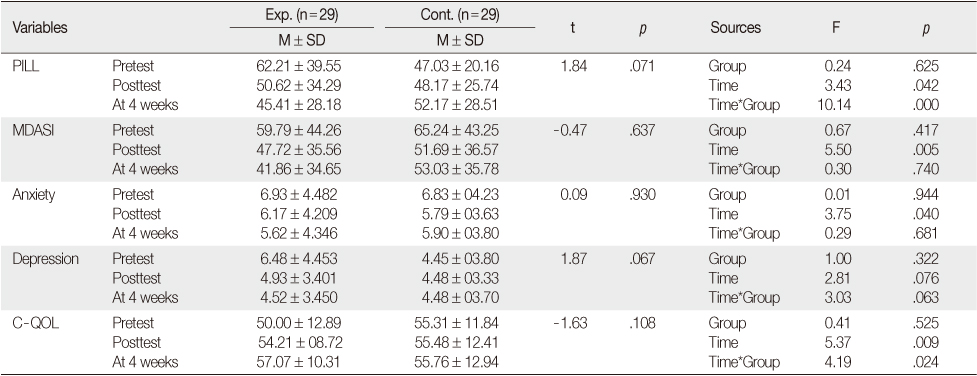Articles
- Page Path
- HOME > J Korean Acad Nurs > Volume 42(2); 2012 > Article
-
Original Article
- Development and Effectiveness of Expressive Writing Program for Women with Breast Cancer in Korea
- Eun Young Park, Mungsun Yi
-
Journal of Korean Academy of Nursing 2012;42(2):269-279.
DOI: https://doi.org/10.4040/jkan.2012.42.2.269
Published online: April 30, 2012
1Associate Professor, College of Nursing, Gachon University, Incheon, Korea.
2Professor, College of Nursing, Seoul National University, Seoul, Korea.
- Address reprint requests to: Park, Eun Young. College of Nursing, Gachon University, Incheon. Korea, 191 Hambacmoi-ro, Yeonsu-dong, Yeonsu-gu, Incheon 406-812. Tel: +82-32-820-4207, 010-5035-1305, FAX: +82-32-820-4201, parkeunyoung@gachon.ac.kr
© 2012 Korean Society of Nursing Science
- 1,821 Views
- 17 Download
- 15 Crossref
Abstract
-
Purpose
- To develop a expressive writing program for women with breast cancer and to identify its effects on stress physical symptom, cancer symptom, anxiety, depression, and QOL.
-
Methods
- A non-equivalent control pre-post design was used. Participants were recruited from self-help groups in six hospitals and were assigned to the experimental group (29) or control group (29). Data were collected before, after, and at four weeks after the intervention program. Changes in the variables were evaluated to test effects of the developed program, using χ2-test, Fisher's exact test, repeated measures ANOVA, and paired t-test.
-
Results
- The expressive writing program was developed for women with breast cancer based on Pennebaker's expressive writing. Significant differences were found between the two groups for stress related to physical symptoms (p<.00) and quality of life (p=.024). No significant differences were found in cancer symptoms, anxiety, or depression between the two groups.
-
Conclusion
- The results indicate that the expressive writing program designed to express cancer-related deep thoughts and emotions helps in decreasing physical symptoms and improving QOL. Further studies are needed to identify the effect on emotions such as anxiety and depression for women with breast cancer with above average levels of anxiety and depression.
This article is base on a part of the first author's doctoral thesis from Seoul National University.
- 1. Burgess C., Cornelius V., Love S., Graham J., Richards M., Ramirez A. Depression and anxiety in women with early breast cancer: Five year observational cohort study. British Medical Journal. 2005;330:702–705. http://dx.doi.org/10.1136/bmj.38343.670868.D3.ArticlePubMedPMC
- 2. Cleeland C.S., Mendoza T.R., Wang X.S., Chou C., Harle M.T., Morrissey M., et al. Assessing symptom distress in cancer patients: The M.D. Anderson symptom inventory. Cancer. 2000;89:1634–1646. http://dx.doi.org/10.1046/j.1533-2500.2001.01023-30.x.ArticlePubMed
- 3. Collie K., Bottorff J.L., Long B.C. A narrative view of art therapy and art making by women with breast cancer. Journal of Health Psychology. 2006;11:761–775. http://dx.doi.org/10.1177/1359105306066632.ArticlePubMedPDF
- 4. Davidson K., Schwatz A.R., Sheffield D., Moord R.S., Lepore S.J., Gerin W.. Lepore S.J., Smyth J. Expressive writing and blood pressure. In: The writing cure. 2003;Washington, DC, American Psychological Association. 17–30.
- 5. Frisina P.G., Borod J.C., Lepore S.J. A meta-analysis of the effects of written emotional disclosure on the health outcomes of clinical populations. The Journal of Nervous and Mental Disease. 2004;192:629–634.ArticlePubMed
- 6. Kim B.R., Kim Y.H., Kim J.S., Jeong I.S., Kim J.S. A study to the coping patterns of cancer patients. Journal of Korean Academy of Nursing. 2003;33:321–330.ArticlePubMedPDF
- 7. Kim E.S., Lee M.K., Choi J.M. In : Sung Y.S. In: Personality trait and anger expression in cancer patients. In: Annual Symposium; 2006, August; Seoul, Korean Psychological Association.
- 8. Kim H.J., Kwon J.H., Kim J.N., Lee R., Lee K.S. Posttraumatic growth and related factors in breast cancer survivors. Korean Journal of Health Psychology. 2008;13:781–799.Article
- 9. Kim S.H., Jun E.Y., Lee W.H. The factors influencing depression in patients with breast cancer. Journal of Korean Oncology Nursing. 2006;6:133–142.
- 10. Laccetti M. Expressive writing in women with advanced breast cancer. Oncology Nursing Forum. 2007;34:1019–1024. http://dx.doi.org/10.1188/07.ONF.1019-1024.ArticlePubMed
- 11. Lazarus R.S. Rice V.H. Evolution of a model of stress, coping, and discrete emotions. In: Handbook of stress, coping, and health: Implications for nursing research, theory, and practice. 2000;Thousand Oaks, CA, Sage. 195–222.
- 12. Lee E.H. Development and psychometric evaluation of a quality of life scale for Korean patients with cancer (C-QOL). Journal of Korean Academy of Nursing. 2007;37:324–333.ArticlePubMedPDF
- 13. Low C.A., Stanton A.L., Bower J.E., Gyllenhammer L. A randomized controlled trial of emotionally expressive writing for women with metastatic breast cancer. Health Psychology. 2010;29(4):460–466. http://dx.doi.org/10.1037/a0020153.ArticlePubMedPMC
- 14. Martin D. Kim M., Kam K. In: Doing psychology experiments. 2008;7th ed. Seoul, Sigma Press. (Original work published 2008).
- 15. Ministry of Health & Welfare and National Cancer Center. Publication No. NCCI-09-1-7-7. Cancer fact and figures: In the Republic of Korea. 2009;Seoul, Author.
- 16. Oh S.M., Min K.J., Park D.B. A study on the standardization of the hospital anxiety and depression scale for Koreans. Journal of Korean Neuropsychiatric Association. 1999;38:289–296.
- 17. Park E.Y., Yi M.S. Illness experience of women with breast cancer in Korea: Using feminist phenomenology. Journal of Korean Academy of Adult Nursing. 2009;21:504–518.
- 18. Pennebaker J.W. Writing about emotional experiences as a therapeutic process. Psychological Science. 1997;8:162–166.ArticlePDF
- 19. Pennebaker J.W. Lee B.H . Writing to Heal. 2007;Seoul, Hakjisa. (Original work published 2004).
- 20. Pennebaker J.W., Seagal J.D. Forming a story: The health benefits of narrative. Journal of Clinical Psychology. 1999;55:1243–1254.ArticlePubMed
- 21. Rosenberg H.J., Rosenberg S.D., Ernstoff M.S., Wolford G.L., Amdur R.J., Elshamy M.R., et al. Expressive disclosure and health outcomes in a prostate cancer population. International Journal of Psychiatry in Medicine. 2002;32:37–53. http://dx.doi.org/10.2190/AGPF-VB1G-U82E-AE8C.ArticlePubMedPDF
- 22. Shim E.J., Mehnert A., Koyama A., Cho S.J, Inui H., Paik N.S., et al. Health-related quality of life in breast cancer: A cross-cultural survey of German, Japanese, and South Korean patients. Breast Cancer Research and Treatment. 2006;99:341–350. http://dx.doi.org/10.1007/s10549-006-9216-x.ArticlePubMedPDF
- 23. Shin H.K., Won H.T. A study on the development of the Korean alexithymia scale. Korean Journal of Clinical Psychology. 1997;16:219–231.
- 24. Shin S.R., Kim N. The effects of dance/movement therapy on the body image and depression of breast cancer patients with breast resection. Journal of Psychotherapy. 2009;9:143–166.
- 25. Smith S., Anderson-Hanley C., Langrock A., Compas B. The effects of journaling for women with newly diagnosed breast cancer. Psycho-Oncology. 2005;14:1075–1082. http://dx.doi.org/10.1002/pon.912.ArticlePubMed
- 26. Smyth J. Written emotional expression: Effect sizes, outcome types, and moderating values. Journal of Consulting and Clinical Psychology. 1998;66:174–184.ArticlePubMed
- 27. Spiegel D., Giese-Davis J. Depression and cancer: Mechanisms and disease progression. Biological Psychiatry. 2003;54:269–282. http://dx.doi.org/10.1016/S0006-3223(03)00566-3.ArticlePubMed
- 28. Stanton A.L., Danoff-Burg S., Sworowski L.A., Collins C.A., Branstetter A.D., Rodriguez-Hanley A., et al. Randomized, controlled trial of written emotional expression and benefit finding in breast cancer patients. Journal of Clinical Oncology. 2002;20:4160–4168. http://dx.doi.org/10.1200/JCO.2002.08.521.ArticlePubMed
- 29. Yun Y.H., Mendoza T.R., Kang I.O., You C.H., Roh J.W., Lee C.G., et al. Validation study of the Korean version of the MD Anderson symptom inventory. Journal of Pain and Symptom Management. 2006;31:345–352.ArticlePubMed
- 30. Zigmond A.S., Snaith R.P. The hospital anxiety and depression scale. Acta Psychiatrica Scandinavica. 1983;67:361–370.ArticlePubMed
REFERENCES
Figure & Data
REFERENCES
Citations

- Effects of a Remote Videoconferencing-based Expressive Writing Program on Posttraumatic Stress, Resilience, and Post-traumatic Growth among Traumatized Nurses
Nam Hee Chae, Ji Young Kim
Journal of Korean Academy of Nursing Administration.2024; 30(2): 152. CrossRef - Care Needs of Advanced Cancer Patients in a Long-term Care Hospital: Patient-Nurse Comparison
Hee-Jung Kang, Kyung-Ah Kang
Asian Oncology Nursing.2023; 23(4): 196. CrossRef - Can emotional expressivity and writing content predict beneficial effects of expressive writing among breast cancer patients receiving chemotherapy? A secondary analysis of randomized controlled trial data from China
Yanni Wu, Dongliang Yang, Biao Jian, Chaixiu Li, Liping Liu, Wenji Li, Xiaojin Li, Chunlan Zhou
Psychological Medicine.2023; 53(4): 1527. CrossRef - Development and effects of a post-traumatic growth program for patients with breast cancer
Sung Hee Choi, Young Whee Lee, Hwa Soon Kim, Soo Hyun Kim, Eun-Hyun Lee, Eun Young Park, Young Up Cho
European Journal of Oncology Nursing.2022; 57: 102100. CrossRef - Effect of Expressive Writing on Professional Quality of Life and Resilience among Intensive Care Unit Nurses
Danbi You, Hye-Ja Park
Journal of Health Informatics and Statistics.2021; 46(3): 276. CrossRef - Effect of prolonged expressive writing on health outcomes in breast cancer patients receiving chemotherapy: a multicenter randomized controlled trial
Yanni Wu, Liping Liu, Wanting Zheng, Chunrao Zheng, Min Xu, Xiaohong Chen, Wenji Li, Lijun Xie, Pengyan Zhang, Xiaoli Zhu, Chuanglian Zhan, Chunlan Zhou
Supportive Care in Cancer.2021; 29(2): 1091. CrossRef - Non-pharmacological therapies for depressive symptoms in breast cancer patients: Systematic review and meta-analysis of randomized clinical trials
Liliana Coutiño-Escamilla, Maricela Piña-Pozas, Aurelio Tobías Garces, Brenda Gamboa-Loira, Lizbeth López-Carrillo
The Breast.2019; 44: 135. CrossRef - The Effects of Expressive Writing Interventions for Patients With Cancer: A Meta-Analysis
Pok-Ja Oh, Soo Kim
Oncology Nursing Forum.2016; 43(4): 468. CrossRef - Does therapeutic writing help people with long-term conditions? Systematic review, realist synthesis and economic considerations
Olga P Nyssen, Stephanie JC Taylor, Geoff Wong, Elizabeth Steed, Liam Bourke, Joanne Lord, Carol A Ross, Sheila Hayman, Victoria Field, Ailish Higgins, Trisha Greenhalgh, Catherine Meads
Health Technology Assessment.2016; 20(27): 1. CrossRef - Effect of Expressive Writing Intervention on Health Outcomes in Breast Cancer Patients: A Systematic Review and Meta-Analysis of Randomized Controlled Trials
Chunlan Zhou, Yanni Wu, Shengli An, Xiaojin Li, Gozde Ozakinci
PLOS ONE.2015; 10(7): e0131802. CrossRef - Expressive writing interventions in cancer patients: a systematic review
Erin L. Merz, Rina S. Fox, Vanessa L. Malcarne
Health Psychology Review.2014; 8(3): 339. CrossRef - Factors Affecting Symptom Experiences of Breast Cancer Patients: Based on the Theory of Unpleasant Symptoms
HyoJin Kim, Sanghee Kim, Hyangkyu Lee, SangEun Oh
Asian Oncology Nursing.2014; 14(1): 7. CrossRef - Written emotional disclosure for women with ovarian cancer and their partners: randomised controlled trial
Emily Arden‐Close, Yori Gidron, Louise Bayne, Rona Moss‐Morris
Psycho-Oncology.2013; 22(10): 2262. CrossRef - Effect of Depression and Anxiety on Symptoms in Thyroid Cancer Patients Undergoing Radioactive Iodine (I131) Therapy
Nami Chun
Asian Oncology Nursing.2012; 12(4): 297. CrossRef - The Relationships between Stigma, Distress, and Quality of Life in Patients with Lung Cancer
Jung Lim Lee, Keum Soon Kim
Journal of Korean Oncology Nursing.2011; 11(3): 237. CrossRef
- Figure
- We recommend
- Related articles
-
- Development and Effectiveness of Progressive Simulation Education Program on Medication Safety for Nursing Students
- Development and Evaluation of an App-Based Self-Management Program for Exercise Practice of Breast Cancer Survivors: A Non-Randomized Controlled Trial
- Development and Effectiveness Evaluation of Comprehensive Mobile-Based, Breastfeeding Promotion Program for Mothers with Gestational Diabetes

Figure 1
Contents of the Expressive Writing Program
Homogeneity Test of Sociodemographic and Medical Characteristics
*Fisher's exact test.
Exp.=Experimental group; Cont.=Control group.
Differences and Repeated Measures ANOVA of Expressive Writing on Variables between Experimental and Control Group (N=58)
Exp.=Experimental group; Cont.=Control group; PILL=Pennebaker's Inventory of Limbic Languidness; MDASI=M.D. Anderson Symptom Inventory; C-QOL=Cancer-Quality of Life.
*Fisher's exact test. Exp.=Experimental group; Cont.=Control group.
Exp.=Experimental group; Cont.=Control group; PILL=Pennebaker's Inventory of Limbic Languidness; MDASI=M.D. Anderson Symptom Inventory; C-QOL=Cancer-Quality of Life.
 KSNS
KSNS
 E-SUBMISSION
E-SUBMISSION




 Cite
Cite

